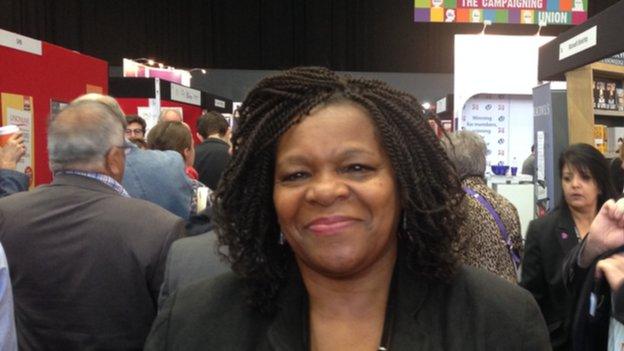Fresh push for all-black Labour shortlists
- Published

Cecile Wright says all-black shortlists should be introduced as a temporary measure
Ed Miliband is facing demands to impose "all black" shortlists for the selection of Labour candidates in certain constituencies.
Labour Black Network launched a "manifesto for change", external at the Labour conference in Manchester.
It wants "action to right the wrong of poor representation of black members".
Labour says it has the "best record" for recruiting black and ethnic minority candidates but accepts there is more to do.
Labour MP and London mayoral candidate David Lammy and frontbencher Diane Abbott have both thrown their weight behind the campaign for all-black shortlists and the Labour Black Network's manifesto, which was launched at a conference fringe event.
All-women shortlists
If parliament reflected the diversity of the British population there would be 36 Black MPs, the Labour Black Network says, but there are currently just nine. Five of them are Labour MPs, a number that has barely increased since the late 1980s when the first black MPs took their seats in the Commons.
Campaigners have been calling for all-black shortlists in certain constituencies for years, but the idea has always been rejected by the Labour leadership.
Labour Black Network founder member, Professor Cecile Wright, said: "It would seem that over the decades things have not progressed as we would like them to.
"The selection process currently works against the interests of certain groups. We know it worked against the interests of women - hence the all-women shortlist as a mechanism to improve gender representation.
"We need a similar mechanism to improve the representation in terms of ethnicity and diversity. Particularly with respect to the African and Caribbean community."
She said "all black shortlists" should be introduced as "a temporary measure in the same way in which we have all-women shortlists as a way of correcting the imbalance that currently exists".
Financial barriers
The Labour Black Network was set up in March this year in response to the Collins review into the the Labour Party's internal structures.
In its submission to the Collins review, it pointed out how little progress the party had made, external in getting black and ethnic minorities into Parliament and local government.
It also highlights financial barriers, obstruction, lack of transparency, bullying and intimidation as factors preventing the selection of black candidates.
The Labour Black Network manifesto calls for action to end what it says are "smear campaigns", rule manipulation and negative briefings in the selection process - and for a bursary to be set up to help black candidates with the cost of campaigning.
'Best records'
It also sets out a range of policies - across health, education, the economy - it wants to see from the next Labour government.
The Labour Black Network says the party has "forgotten" the work done by black MPs and activists.
A Labour Party spokesperson said: "Labour has the best record of any party in selecting BAME (black and ethnic minority) candidates, with more ethnic minority MPs, MEPs, and local councillors than any other party.
"Labour has taken the lead in tackling under-representation and increasing diversity in politics.
"We know there is always more to do and we will continue to work hard to ensure that we break down the barriers to political participation."